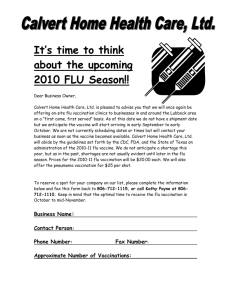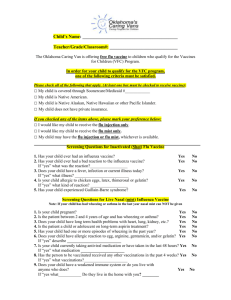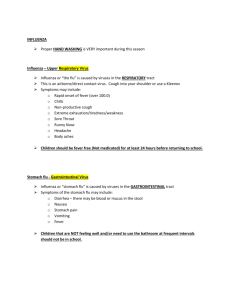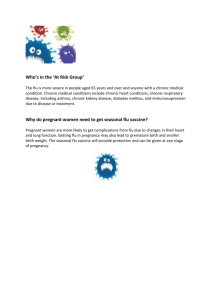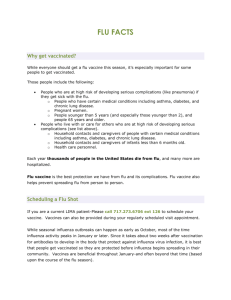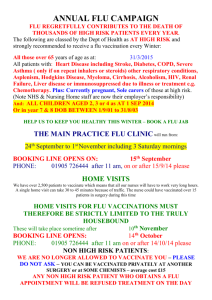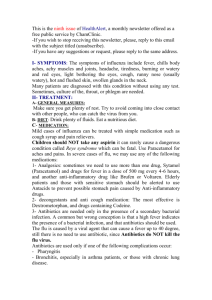Truth about Influenza - Intermountain Healthcare
advertisement
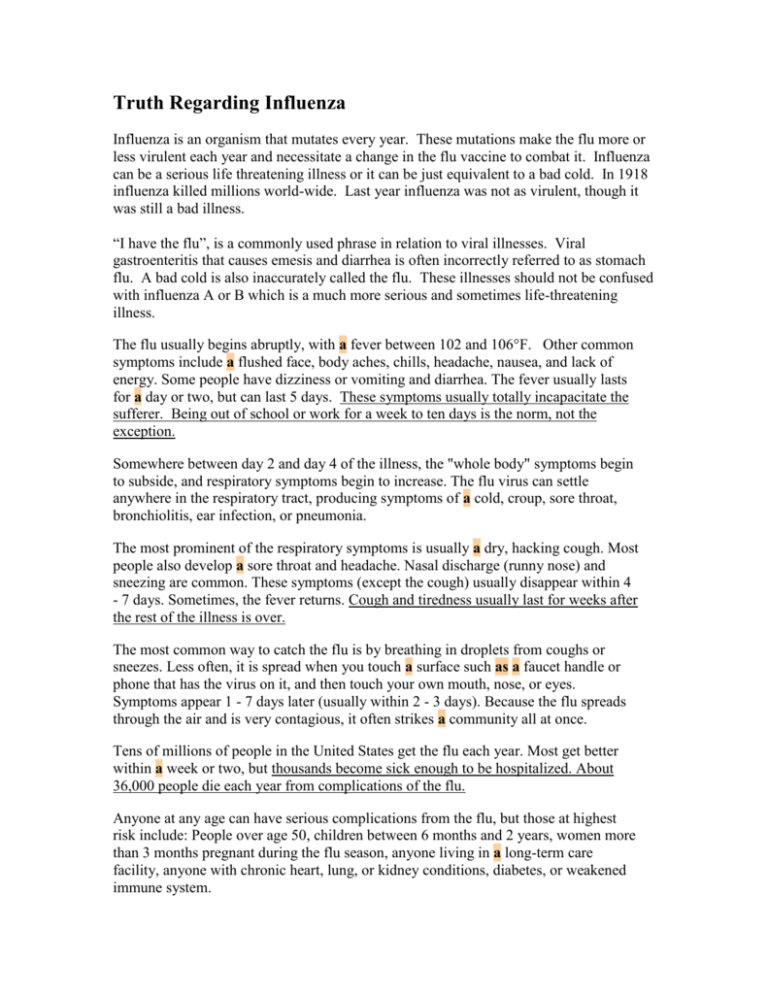
Truth Regarding Influenza Influenza is an organism that mutates every year. These mutations make the flu more or less virulent each year and necessitate a change in the flu vaccine to combat it. Influenza can be a serious life threatening illness or it can be just equivalent to a bad cold. In 1918 influenza killed millions world-wide. Last year influenza was not as virulent, though it was still a bad illness. “I have the flu”, is a commonly used phrase in relation to viral illnesses. Viral gastroenteritis that causes emesis and diarrhea is often incorrectly referred to as stomach flu. A bad cold is also inaccurately called the flu. These illnesses should not be confused with influenza A or B which is a much more serious and sometimes life-threatening illness. The flu usually begins abruptly, with a fever between 102 and 106°F. Other common symptoms include a flushed face, body aches, chills, headache, nausea, and lack of energy. Some people have dizziness or vomiting and diarrhea. The fever usually lasts for a day or two, but can last 5 days. These symptoms usually totally incapacitate the sufferer. Being out of school or work for a week to ten days is the norm, not the exception. Somewhere between day 2 and day 4 of the illness, the "whole body" symptoms begin to subside, and respiratory symptoms begin to increase. The flu virus can settle anywhere in the respiratory tract, producing symptoms of a cold, croup, sore throat, bronchiolitis, ear infection, or pneumonia. The most prominent of the respiratory symptoms is usually a dry, hacking cough. Most people also develop a sore throat and headache. Nasal discharge (runny nose) and sneezing are common. These symptoms (except the cough) usually disappear within 4 - 7 days. Sometimes, the fever returns. Cough and tiredness usually last for weeks after the rest of the illness is over. The most common way to catch the flu is by breathing in droplets from coughs or sneezes. Less often, it is spread when you touch a surface such as a faucet handle or phone that has the virus on it, and then touch your own mouth, nose, or eyes. Symptoms appear 1 - 7 days later (usually within 2 - 3 days). Because the flu spreads through the air and is very contagious, it often strikes a community all at once. Tens of millions of people in the United States get the flu each year. Most get better within a week or two, but thousands become sick enough to be hospitalized. About 36,000 people die each year from complications of the flu. Anyone at any age can have serious complications from the flu, but those at highest risk include: People over age 50, children between 6 months and 2 years, women more than 3 months pregnant during the flu season, anyone living in a long-term care facility, anyone with chronic heart, lung, or kidney conditions, diabetes, or weakened immune system. FLU SHOT INFORMATION There are two types of flu vaccines: a flu shot and a nasal spray-type vaccine. The flu shot contains killed (inactive) viruses, so it is not possible to get the flu from this type of vaccine. However, some people do get a low-grade fever or achiness for a day or two after the shot as their immune systems gear up to recognize the virus. The flu shot is approved for people age 6 months and older. A nasal spray-type flu vaccine called Flutist uses a live, weakened virus instead of a dead one like the flu shot. It is approved for healthy people aged 2 to 49. The vaccine helps the lining of the nose fight off actual viral infections. It should not be used in those who have asthma or children under age 5 who have repeated wheezing episodes. Most people achieve protection from the flu approximately 2 weeks after receiving the vaccine. RISKS AND SIDE EFFECTS Most people have no side effects from the flu shot. Soreness at the injection site or minor aches and low grade fever may be present for several days. Unlike the swine flu vaccine used in 1976, flu vaccines in recent years have shown no association with Guillain-Barre syndrome (GBS) in children, and an extremely small increase in the risk of GBS in adults. This risk is far outweighed by the number of severe flu cases prevented by immunization. As is the case with any drug or vaccine, there is a rare possibility of allergic reaction. Data indicates the flu vaccine does not harm the fetus when given to a pregnant women, nor does it affect reproductive health. We recommend that everyone older than 6 months get immunized against influenza annually. While not everyone gets immunity to the influenza vaccine, and some years the flu vaccine is not very effective; it is the best weapon we have against this illness. If you consider being out of work or school for ten days and risking exposing friends and family members to this illness, the vaccine and the minor side effects you may get from it are inconsequential. Epidemiologists are warning us that we are due to have a very virulent flu in the coming years. The last terribly virulent influenza outbreak was in 1918. It killed millions of people. At that time society shut down for 2 months. Schools and churches were closed. Assembly in groups was prohibited. Our society about 100 years later is much more co-dependent. We don’t live in an agrarian society any longer. Shipping would stop, stores would close and commerce would shut down. It will be a major disaster when it occurs. The best offense against a virulent flu is the flu shot. We highly encourage all patients to protect themselves References American Academy of Pediatrics Committee on Infectious Diseases. Recommended immunization schedules for children and adolescents -- United States, 2008. Pediatrics. 2008 Jan;121(1):219-20. Recommendations of the Advisory Committee on Immunization Practices (ACIP), 2008. MMWR. July 17, 2008/57(Early Release);1-60. Recommended Immunization Schedule for Persons Aged 7-18 Years -- United States, 2008. MMWR. October 19, 2007/56(41);Q1-Q4. Advisory Committee on Immunization Practices. Recommended adult immunization schedule: United States, October 2007-September 2008. Ann Intern Med. 2007 Nov 20;147(10):725-9. US Food and Drug Administration. FDA Approves Nasal Influenza Vaccine for Use in Younger Children. Rockville, MD: National Press Office; September 19, 2007.

